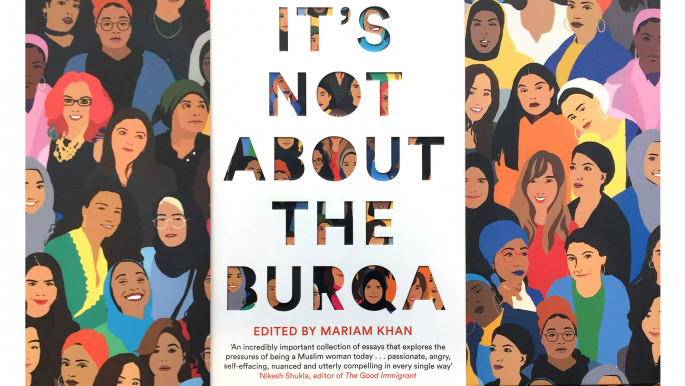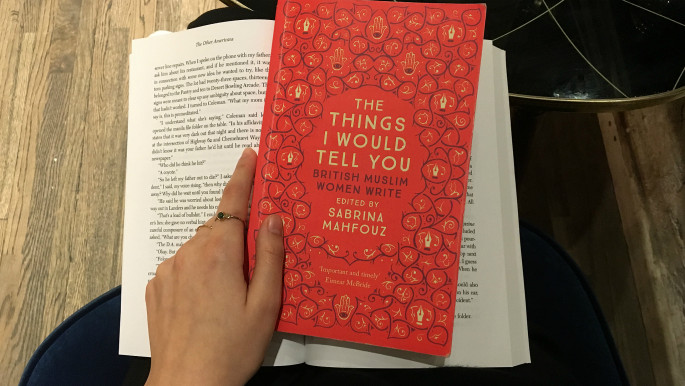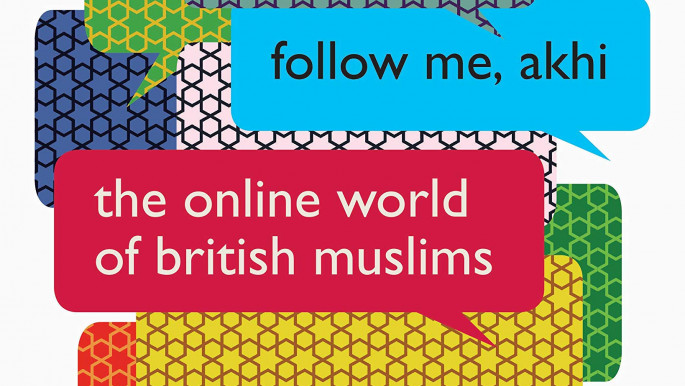Follow Me, Akhi: Tapping into the online world of British Muslims
But the way the vast majority of Muslims use the internet is so much more interesting and innovative – and have nothing to do with terrorism, despite what the mainstream media would have you believe.
It's these myriad ways, from dating to gaming via the creation of online spaces that mimic the functions of a mosque, that journalist Hussein Kesvani explores in his first book, Follow Me, Akhi: The Online World of British Muslims.
Kesvani seems destined to write this book. He worked as a producer and researcher, among other things, before being hired by Buzzfeed as a religion reporter.
 |
But the way the vast majority of Muslims use the internet is so much more interesting and innovative – and have nothing to do with terrorism, despite what the mainstream media would have you believe |  |
Having dreamed of covering the politics beat, he was initially reluctant to be pigeonholed into writing about Islam just because of his own Muslim background.
"Don't get me wrong, I really enjoyed the job," he says. "But I think I was always aware that the reason I was where I was came because of my ethnic and religious background, and that was always reinforced when deeply reported stories I published didn't really garner the same attention as a piece of gossip that came out of Westminster's pubs."
The idea for Follow Me, Akhi came after Kesvani left Buzzfeed in 2016, and realised that "no news organisation in the UK was covering religion well and that I wouldn't be able to do any community justice in such an environment".
With a notebook full of stories about "people making their own prayer spaces, or challenging mosque committees, or even just forming a Facebook group to talk about sexual health", Kesvani realised he wanted to write about the "insightful and revolutionary acts that showed the real concerns facing British Muslims".
"The conflicts and battles around self expression, reconciling aspects of faith and identity within a community, were way more pressing and telling of the British Muslim experience, than people going to go join the Islamic State group," he adds.
Of course, there's no shortage of books about Muslims, from Sayeeda Warsi's The Enemy Within to James Fergusson's Al Britannia, but Kesvani wanted books that said something about young people's experiences with Islam, "especially generations who lived at a time when there was this huge expansion of social technology".
 |
| Read also from The New Arab's Book Club: It's Not About the Burqa: It's about letting Muslim women speak |
The result is a book that is surprising, entertaining and doing something genuinely new. Of course, extremism is covered, but it wasn't in Kesvani's initial draft, something he says was "very intentional", because there are bigger issues to Muslims in Britain are grappling with: "Concerns around identity, reconciling aspects of faith that is in conflict with their families or communities, wanting a voice in the mosque, or even just participating in cultural arenas where they would feel excluded in real life, illustrate much more interesting tales."
Kesvani continues: "I think the focus on extremism – which is certainly the way lots of news editors see things – ends up reducing the humanity of young Muslims; it diminishes how much they are affected by extremist activity and how the state responds to that.
"It also puts young Muslims in a position where they have to explain the apparatus of violence – it makes them accountable for decades worth of failed government policy, the increasing reach of the security state as well as deep theological questions. It doesn't actually let them grow up as citizens, and I wanted to show how, for all its imperfections, the online world provided an environment which at least allowed them to explore themselves."
And it's the ways in which young Muslims in particular are exploring their faith and themselves that makes for such compelling reading in Follow Me, Akhi.
 |
Of course, extremism is covered, but it wasn't in Kesvani's initial draft, something he says was 'very intentional', because there are bigger issues to Muslims in Britain are grappling with |  |
One of the most interesting, for me at least, was Kesvani's look at gaming, and how Muslims are connecting with each other through platforms like Discord, which allow gamers to create communities and speak to each other while playing.
The use of gaming as a way to connect shows "how lots of the conversations that most young Muslims are finding important are migrating to more obscure online platforms – ones where privacy is considered more, where it's harder for older family members to find things out etc".
But more than privacy, Kesvani's book illustrates how Muslims are using internet spaces, from Facebook groups to Tumblr blogs to YouTube, to have honest conversations, some of which could never have taken place in traditional offline Muslim spaces, namely the mosque.
Kesvani was particularly surprised at how Muslim women were using "social platforms to have challenging and important conversations".
He says: "Tumblr is where Hind Makki's 'Side Entrance' – a project that aimed to show the small spaces Muslim women around the world were being made to worship in – took off, and it's also the place where Muslim women were having conversations about relationships, sexual health and spiritual wellbeing, and [were] responding to the #MeToo movement.
"It was an open platform but one where the user often has more control over their space, and who gets to comment and who doesn't. It goes to show how a simple technology can facilitate conversations that a physical mosque space can't, and where other platforms like Twitter and Facebook are ill equipped to do."
One of the book's most poignant and heartbreaking moments comes in the story of a woman who secretly got an abortion. Unable to turn to people in person, she sought advice, comfort and refuge online, and received help from another Muslim woman.
 |
|
| Read also from The New Arab's Book Club: The Things I Would Tell You: Capturing the diverse voices of British Muslim women |
The story could easily have been sensationalised – Kesvani says he can picture it with a headline like "Devout Muslim woman escapes hardline family to benefit from the virtues of the West" – but he handles it with respect and care.
Kesvani says: "I really wanted to let her tell her own story, and I said to myself that if I was going to include it in the book, then it would have to serve the overall purpose of showing how Muslims were using technology to pursue their own lives, to confront their own battles and to be as true to themselves as possible.
"There were stories I had found while researching which I had written up, and didn't make it in the book because I felt on hindsight that they didn't fulfil that purpose."
One of the reasons that Follow Me, Akhi works so well is because Kesvani is so close to the subject himself: he grew up in a practising Muslim family and had to navigate a "lot of conflicted ideas of what Islam was and what it meant to me" in a country that his family came to as refugees.
 |
I was in this state where I would call myself a Muslim, proudly, but at the same time be deeply uncomfortable with some aspects of both the way my faith was taught to me, and about the cultural context in which it was embedded |  |
"I was in this state where I would call myself a Muslim, proudly, but at the same time be deeply uncomfortable with some aspects of both the way my faith was taught to me, and about the cultural context in which it was embedded," he explains.
"And I felt that having spent so much of my formative years in forums and online communities, that this feeling was really widespread.
"Even the most 'devout' and conservative Muslims I know have these kinds of conflicts, and have to reconcile their expressions of faith with what they feel is true to themselves and their individual identities.
 |
|
"What I wanted to show was that the 'religious' experience was inherently a complicated one, that is filled with these small conflicts and nuances - where people are constantly having to evaluate themselves.
"It's a far cry from how Western secular media portrays religious people, especially people of colour, where they are presented to either be lapsed or absconded completely, or people who routinely follow scripture without question."
Kesvani demonstrates how Muslims are using the internet to explore scripture and gain a deeper understanding of their faith, a role that usually falls to mosques. He's clear throughout that when it comes to learning about Islam, the internet hasn't negated the need for physical spaces, and that the two are currently working in tandem, each with their own advantages and disadvantages.
But what does the future hold for Muslims and the internet? Kesvani has some thoughts.
"As tech becomes more integrated in our everyday lives, it could be the case that the way authority is transmitted online becomes more regulated i.e. there might be more fatwas on digital culture and interpretations," says Kesvani.
"At the same time, I think we're heading toward a social media climate which emphasises less exposure. So you will have more private groups emerging, more closed discussion groups, and perhaps even more platforms like Snapchat and TikTok, where content is made for a very specific, small audience rather than for the masses.
"Imams could use that as a way of speaking directly to young people in their own community, and they might be able to innovate how they teach and lecture in accordance to the needs of their specific community, rather than feeling they need to perform for a large, international audience.
"I also think that for a lot of young Muslims, who are dealing with things like social media burnout - which affects consumers of content as well as producers - there might be a shift toward more private forms of worship, ie. that fewer Muslims will want to show how they worship and express their Islamic identity to masses of people.
"That's not to say that they will reject Islam, or try to hide their religious identity on social media platforms. Rather, I think that they will be more conscious about what aspects of that identity they will express online, and what aspects they will keep private or hidden entirely."
What is guaranteed is that the ways in which Muslims use the internet will continue to evolve, perhaps so much so that Kesvani finds himself writing a second volume of his book in a few years' time. If he does, I'll definitely be reading.
Sarah Shaffi is a freelance literary journalist and editor. She writes about books for Stylist Magazine online and is books editor at Phoenix Magazine. She is a judge for the Jhalak Prize 2019. Sarah is editor-at-large at independent children's publisher Little Tiger Group. She regularly chairs author events, and is co-founder of BAME in Publishing, a networking group for people of colour in publishing.
Follow her on Twitter: @sarahshaffi



